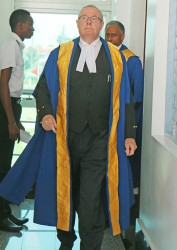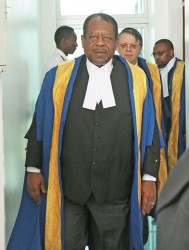The Caribbean Court of Justice (CCJ), sitting for the first time in Guyana, yesterday heard arguments on an application for special leave to appeal a criminal conviction and will give its ruling later.
Hearing arguments in the case of Paul Lashley and John Campayne v Detective Corporal Winston Singh were CCJ President Sir Dennis Byron and other members of the court, Justice David Hayton, Justice Jacob Wit, Justice Winston Anderson and Justice Adrian Saunders.
The sitting, which is the first in Guyana, was held at the Guyana International Conference Centre at Liliendaal, where the court will sit again today with two more matters down to be heard.

Attorneys Sanjeev Datadin and Charles Ramson Jnr represented the applicants Lashley and Campayne, while attorney Sonia Joseph, who is attached to the Chambers of the Director of Public Prosecutions, represented the respondent.
The matter was called promptly at 10 am and arguments lasted for about an hour and a half.
Opening the arguments were Datadin and Ramson. Ramson later explained to reporters that the matter was an application for special leave to appeal in a criminal matter. He said that his clients were charged with break and enter and larceny in the Magistrate’s Court and were subsequently convicted. He said they subsequently appealed the matter in the Court of Appeal but lost. “We are now seeking to take that appeal to the CCJ. Before we get there we need the court’s leave…,” he explained.
He said that at this hearing, the aim was to show that the court has the jurisdiction “to grant us leave, then we have to be able to demonstrate to the court that there are good grounds for them to give us leave to appeal… if they think that we don’t have any merit they would refuse it.”
In his arguments, Datadin examined the relationship between sections seven and eight of the CCJ Act as he sought to demonstrate that there was an arguable appeal. Among the grounds that he cited was the incompetence of counsel at trial. Both men are currently serving four-year prison terms.
Meanwhile, Joseph sought to convince the court that the applicants had no case but encountered some difficulty while making her arguments. She was told that she was “nine years too late with the argument,” and at another point during her submissions, she was told that the position that she was advocating had little chance of success. Joseph told the court that there was no evidence before the court that the men’s legal counsel did not take instructions from his clients.

Ramson, when asked how he felt they did during the hearing, responded, “Time will tell. Time will tell.”
He also told reporters that what is important to note is the significance of the court presiding here in Guyana. “I think that it is an honour and privilege for us, or Guyana to host the CCJ…,” he said, while issuing an invite to all the other Caribbean countries to get on board with the CCJ. “…This is a national and regional appellate jurisdiction and there is no need at this stage for other countries to decline/refuse to sign on,” he said.
Several members of the local legal fraternity turned up to witness the hearing. Among those present were head of the University of Guyana Law Faculty Sheldon A. McDonald and students.
Today, at 10 am, the case of Feizal Mohamed Amin (trading under the name style and firm of Amin Lumber Enterprise) v Guyana Oil Company Limited will be heard while another matter, Daniel Ramlagan by Ramkumarie Ramlagan v Narine Singh by Saiojine Singh will be heard at 12.15 pm.
The culmination of the CCJ’s itinerant visit will be a special sitting in honour of the retirement of Justice Desiree Bernard tomorrow.






